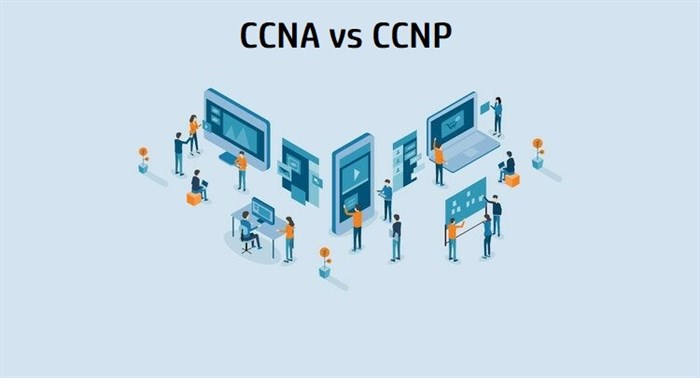The CCNA and CCNP certification exams have become popular among IT professionals over the last few years. They are currently considered among some of the most valuable IT-related certifications and can make a significant difference in your career pathway.
Both CCNA and CCNP are a part of Cisco certification courses offered by the mass networking and infrastructure component provider. While they are pretty similar in their ambit and certification costs, there are some differences that aspirants should consider before selecting their course.
Let us understand what each certification entails.
-
CCNP (Cisco Certified Network Professional)
The CCNP course is generally for IT professionals with at least a year of experience in networking. A secondary school diploma or an equivalent is mandatory for all aspirants. The CCNP courses seek to equip network professionals with specialized training in Cisco’s broad range of high-end network solution products for IT infrastructure implementation, maintenance, and planning.
CCNP training covers a range of topics, including:
- Remote access from Cisco
- Advanced Cisco routing
- Switching Cisco multilayers
- Converged network optimization of the network
- Internet scalability
IT professionals opting for this program have the training to engage in troubleshooting, installing, and maintaining both WAN and LAN for systems between 100 and 500 knots. The aspirants also acquire competence in handling various networks and protocols, including route redistribution, Access listings, Ethernet, and AppleTalk.
The main focus of the CCNP certification course is on helping develop an aspirant’s understanding of Cisco’s IP switched network and IP routing technology. The certification examination also measures their ability to solve problems, develop test scenarios, and maintain different network methodologies.
CCNP certification cost is presently at USD 900 and covers the following exams:
- 300-101 ROUTE for Implementing Cisco IP Routing (ROUTE)
- 300-115 SWITCH for Implementing Cisco IP Switched Networks (SWITCH)
- 300-135 TSHOOT for Troubleshooting and Maintaining Cisco IP Networks (TSHOOT)
-
CCNA (Cisco Certified Network Associate)
The CCNA ranks high among Cisco courses as it has one of the most popular entry-level networking certifications. It aims to equip enthusiasts and beginners who already have some networking expertise with an industry-standard associate certification.
CCNA aspirants have skills for installing, maintaining, and troubleshooting medium networking devices. This program also tests and trains students to troubleshoot and install end-to-end networking solutions, besides providing them with an opportunity to learn about Cisco’s networking basics and concepts.
While the CCNA training is specialized to suit a Cisco environment, it also is helpful at a fundamental level — those who obtain this certification can use their knowledge and improve their marketability throughout different platforms across industries.
CCNA exams are priced slightly higher than CCNP, allowing the students to pursue either of:
- Option1: 200-120 CCNA Interconnecting Cisco Networking Devices: Accelerated (CCNAX), or
- Option 2, comprising: 100-101 ICND1 Interconnecting Cisco Networking Devices Part 1 (ICND1) and 200-101 ICND2 for Interconnecting Cisco Networking Devices Part 2 (ICND2).
-
Understanding the Differences between CCNP and CCNA
While both CCNA and CCNP have emerged as popular certifications, aspirants need to be aware of their differences.
| Sl. No. | Characteristic | CCNA | CCNP |
|
|
Intended for | Beginners and enthusiasts | Experienced network professionals |
|
|
Level of Knowledge | Entry-level | Advanced |
|
|
Focus on | Small and medium networks | Network optimization and Internet
scale-up |
|
|
Test parameters | Fundamental elements of routing and switching | Improved knowledge and
understanding of the cooperation between WANs and LANs |
|
|
Nature of test | Broader | In-depth |
|
|
Time taken for
completing certification |
Shorter – one or two exams | Longer – three exams |
|
|
Industry recognition
in terms of salaries |
Lower than CCNA | Comparatively higher on average
than CCNA, considering the level of knowledge imparted and tested |
-
So Which Among These Should You Opt for?
Both CCNA and CCNP are industry-recognized certifications for aspiring network professionals looking to begin their journey in a Cisco network environment. However, given the high degree of knowledge imparted and tested in a CCNP certification, it is considered the senior certification among the two. CCNP explores network operations and associated contents such as safety and wireless options more in-depth than CCNA, and there is a greater demand for it across IT organizations.
Clearing the core exam of a CCNP track also qualifies you to take the CCIE lab. For instance, passing the 350-401 ENCOR exam allows you to take the lab for CCIE Enterprise Infrastructure or CCIE Enterprise Wireless, as there are no separate written exams for CCIE anymore. Aspirants also do not need to take the CCNA first to appear for CCNP.
The choice, therefore, seems obvious.
Additional Read: Assignment Help to Secure the Quality Grades in Score Card







































































